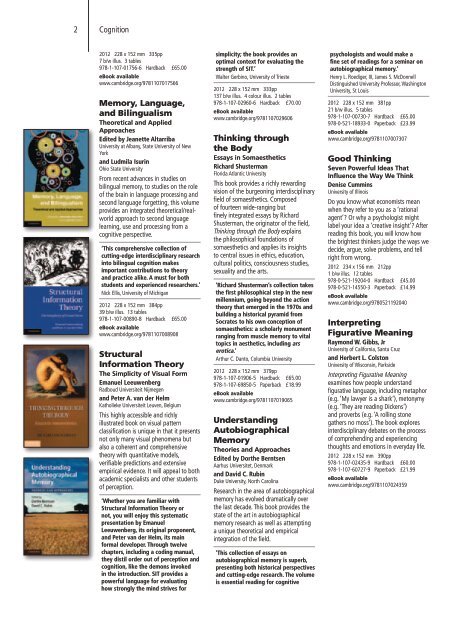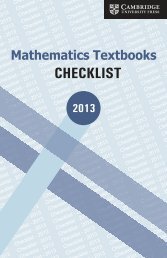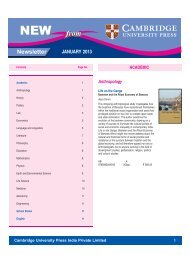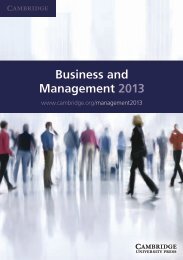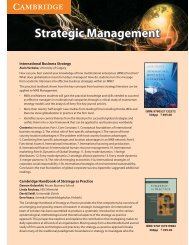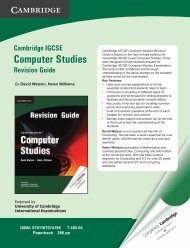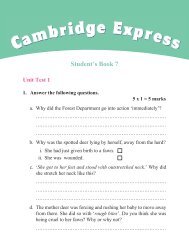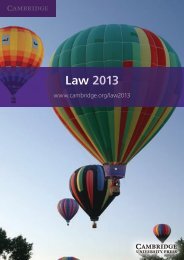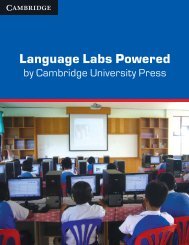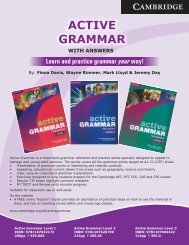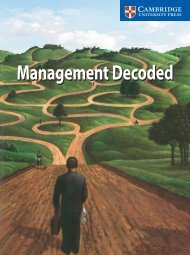Psychology 2013 - Cambridge University Press India
Psychology 2013 - Cambridge University Press India
Psychology 2013 - Cambridge University Press India
You also want an ePaper? Increase the reach of your titles
YUMPU automatically turns print PDFs into web optimized ePapers that Google loves.
2 Cognition<br />
2012 228 x 152 mm 335pp<br />
7 b/w illus. 3 tables<br />
978-1-107-01756-6 Hardback £65.00<br />
eBook available<br />
www.cambridge.org/9781107017566<br />
Memory, Language,<br />
and Bilingualism<br />
Theoretical and Applied<br />
Approaches<br />
Edited by Jeanette Altarriba<br />
<strong>University</strong> at Albany, State <strong>University</strong> of New<br />
York<br />
and Ludmila Isurin<br />
Ohio State <strong>University</strong><br />
From recent advances in studies on<br />
bilingual memory, to studies on the role<br />
of the brain in language processing and<br />
second language forgetting, this volume<br />
provides an integrated theoretical/realworld<br />
approach to second language<br />
learning, use and processing from a<br />
cognitive perspective.<br />
‘This comprehensive collection of<br />
cutting-edge interdisciplinary research<br />
into bilingual cognition makes<br />
important contributions to theory<br />
and practice alike. A must for both<br />
students and experienced researchers.’<br />
Nick Ellis, <strong>University</strong> of Michigan<br />
2012 228 x 152 mm 384pp<br />
39 b/w illus. 13 tables<br />
978-1-107-00890-8 Hardback £65.00<br />
eBook available<br />
www.cambridge.org/9781107008908<br />
Structural<br />
Information Theory<br />
The Simplicity of Visual Form<br />
Emanuel Leeuwenberg<br />
Radboud Universiteit Nijmegen<br />
and Peter A. van der Helm<br />
Katholieke Universiteit Leuven, Belgium<br />
This highly accessible and richly<br />
illustrated book on visual pattern<br />
classification is unique in that it presents<br />
not only many visual phenomena but<br />
also a coherent and comprehensive<br />
theory with quantitative models,<br />
verifiable predictions and extensive<br />
empirical evidence. It will appeal to both<br />
academic specialists and other students<br />
of perception.<br />
‘Whether you are familiar with<br />
Structural Information Theory or<br />
not, you will enjoy this systematic<br />
presentation by Emanuel<br />
Leeuwenberg, its original proponent,<br />
and Peter van der Helm, its main<br />
formal developer. Through twelve<br />
chapters, including a coding manual,<br />
they distil order out of perception and<br />
cognition, like the demons invoked<br />
in the introduction. SIT provides a<br />
powerful language for evaluating<br />
how strongly the mind strives for<br />
simplicity; the book provides an<br />
optimal context for evaluating the<br />
strength of SIT.’<br />
Walter Gerbino, <strong>University</strong> of Trieste<br />
2012 228 x 152 mm 333pp<br />
137 b/w illus. 4 colour illus. 2 tables<br />
978-1-107-02960-6 Hardback £70.00<br />
eBook available<br />
www.cambridge.org/9781107029606<br />
Thinking through<br />
the Body<br />
Essays in Somaesthetics<br />
Richard Shusterman<br />
Florida Atlantic <strong>University</strong><br />
This book provides a richly rewarding<br />
vision of the burgeoning interdisciplinary<br />
field of somaesthetics. Composed<br />
of fourteen wide-ranging but<br />
finely integrated essays by Richard<br />
Shusterman, the originator of the field,<br />
Thinking through the Body explains<br />
the philosophical foundations of<br />
somaesthetics and applies its insights<br />
to central issues in ethics, education,<br />
cultural politics, consciousness studies,<br />
sexuality and the arts.<br />
‘Richard Shusterman’s collection takes<br />
the first philosophical step in the new<br />
millennium, going beyond the action<br />
theory that emerged in the 1970s and<br />
building a historical pyramid from<br />
Socrates to his own conception of<br />
somaesthetics: a scholarly monument<br />
ranging from muscle memory to vital<br />
topics in aesthetics, including ars<br />
erotica.’<br />
Arthur C. Danto, Columbia <strong>University</strong><br />
2012 228 x 152 mm 379pp<br />
978-1-107-01906-5 Hardback £65.00<br />
978-1-107-69850-5 Paperback £18.99<br />
eBook available<br />
www.cambridge.org/9781107019065<br />
Understanding<br />
Autobiographical<br />
Memory<br />
Theories and Approaches<br />
Edited by Dorthe Berntsen<br />
Aarhus Universitet, Denmark<br />
and David C. Rubin<br />
Duke <strong>University</strong>, North Carolina<br />
Research in the area of autobiographical<br />
memory has evolved dramatically over<br />
the last decade. This book provides the<br />
state of the art in autobiographical<br />
memory research as well as attempting<br />
a unique theoretical and empirical<br />
integration of the field.<br />
‘This collection of essays on<br />
autobiographical memory is superb,<br />
presenting both historical perspectives<br />
and cutting-edge research. The volume<br />
is essential reading for cognitive<br />
psychologists and would make a<br />
fine set of readings for a seminar on<br />
autobiographical memory.’<br />
Henry L. Roediger, III, James S. McDonnell<br />
Distinguished <strong>University</strong> Professor, Washington<br />
<strong>University</strong>, St Louis<br />
2012 228 x 152 mm 381pp<br />
21 b/w illus. 5 tables<br />
978-1-107-00730-7 Hardback £65.00<br />
978-0-521-18933-0 Paperback £23.99<br />
eBook available<br />
www.cambridge.org/9781107007307<br />
Good Thinking<br />
Seven Powerful Ideas That<br />
Influence the Way We Think<br />
Denise Cummins<br />
<strong>University</strong> of Illinois<br />
Do you know what economists mean<br />
when they refer to you as a ‘rational<br />
agent’ Or why a psychologist might<br />
label your idea a ‘creative insight’ After<br />
reading this book, you will know how<br />
the brightest thinkers judge the ways we<br />
decide, argue, solve problems, and tell<br />
right from wrong.<br />
2012 234 x 156 mm 212pp<br />
1 b/w illus. 12 tables<br />
978-0-521-19204-0 Hardback £45.00<br />
978-0-521-14550-3 Paperback £14.99<br />
eBook available<br />
www.cambridge.org/9780521192040<br />
Interpreting<br />
Figurative Meaning<br />
Raymond W. Gibbs, Jr<br />
<strong>University</strong> of California, Santa Cruz<br />
and Herbert L. Colston<br />
<strong>University</strong> of Wisconsin, Parkside<br />
Interpreting Figurative Meaning<br />
examines how people understand<br />
figurative language, including metaphor<br />
(e.g. ‘My lawyer is a shark’), metonymy<br />
(e.g. ‘They are reading Dickens’)<br />
and proverbs (e.g. ‘A rolling stone<br />
gathers no moss’). The book explores<br />
interdisciplinary debates on the process<br />
of comprehending and experiencing<br />
thoughts and emotions in everyday life.<br />
2012 228 x 152 mm 390pp<br />
978-1-107-02435-9 Hardback £60.00<br />
978-1-107-60727-9 Paperback £21.99<br />
eBook available<br />
www.cambridge.org/9781107024359


